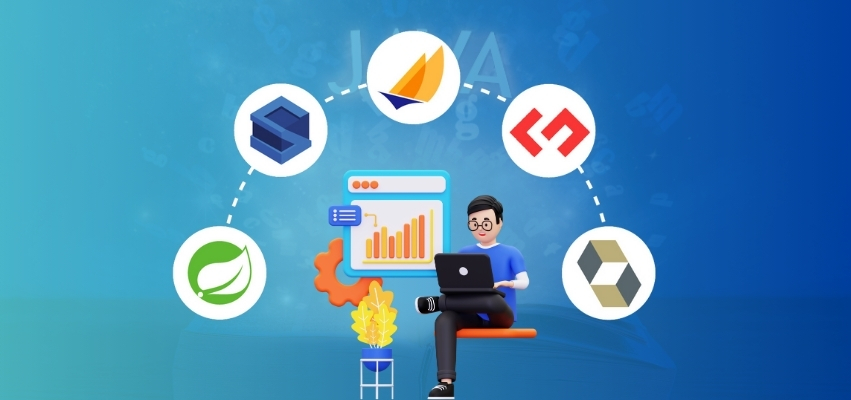
Top Java Frameworks for Web Development - Complete Guide
In this article, we'll take a look at 10 of the best Java frameworks for web development and their key features.
In this article, we'll explore 10 of the best Java frameworks for web development and highlight their key features.
Java is a well-established, robust programming language, widely used across various industries like healthcare, banking, and finance. It's a go-to choice for developing mobile apps, blockchain solutions, and cryptocurrency exchanges.
One of Java's most significant advantages is its open-source nature and large, active developer community. This has led to the creation of several excellent frameworks for building web applications, network solutions, ORM, and more.
In this guide, we’ll look at the most prominent Java frameworks used by software developers worldwide.
How Do Java Frameworks Work?
Selecting the right framework is a crucial step for developers when building their tech stack for any new app project. Java offers a variety of frameworks tailored for specific applications—whether for IoT, microservices, REST APIs, web, mobile, or desktop apps.
Java frameworks come equipped with libraries that include ready-made code templates, classes, and components to speed up development. This makes it easy for developers to set up the infrastructure and start writing code without dealing with hardware and software setup.
Many frameworks also offer quick setups, enabling developers to work more efficiently.
Top 10 Java Frameworks
Choosing the best Java framework depends on several factors, such as the type of software, the developer's expertise, the additional languages and tools in the stack, and individual preferences. While no single framework is universally better, some have stood the test of time. Below are the most popular and reliable Java frameworks for diverse projects:
1. Spring
Spring is a popular open-source framework used to build enterprise-level web and mobile applications. It offers several components, including Spring Core, Spring Web MVC, Spring AOP, and more. Additionally, it supports Groovy and Kotlin.
Companies like Netflix and eBay use Spring to power their systems.
Spring's key advantages include:
- XML and annotation-based setup
- Lightweight and easy to deploy
- Support for dependency injection
However, newcomers might find Spring complex without prior Java programming experience.
2. Apache Struts
Struts is an open-source framework used to build efficient web applications. It integrates easily with other Java frameworks, such as Spring or Hibernate, making it highly flexible.
The key advantages of Struts include:
- Plugin-based design
- Easy setup
- Flexibility and faster development time
However, familiarity with JSP and Java Servlet API is required to use Struts effectively.
3. Hibernate
Hibernate is a Java ORM (Object-Relational Mapping) framework mainly used for database interaction. It simplifies database management, particularly when working with multiple databases.
Key benefits include:
- Easy scalability
- Simple configuration and modification
- Minimal data conversion for various databases
Hibernate is an ideal choice for OOP projects requiring both high productivity and portability.
4. Grails
Built on Spring Boot and powered by Groovy, Grails is an open-source JVM framework. It supports JDK, Java EE containers, and many integrations like Hibernate and Quartz.
Grails is favored by companies like Oracle, IBM, and Netflix for developing a wide range of applications.
Key advantages include:
- Simple installation and use
- Easy integration with existing Java code
- Wide range of plugins
It's especially suitable for small to medium-sized projects with real-time RAD development needs.
5. Apache Wicket
Wicket is a full-stack, component-based web application framework offered by the Apache Foundation. Compatible with Servlet API 3.1+, Wicket emphasizes clean separation between markup and logic.
Key features include:
- Reusable components for fast development
- Pure Java integration with HTML
- Secure URL handling and multi-language support
Wicket is great for building scalable, secure web applications.
6. JavaServer Faces (JSF)
Developed by Oracle, JSF simplifies the creation of server-based web applications and user interfaces. Its reusable UI components and powerful libraries make it highly productive.
However, developers need a solid understanding of Java due to its complexity.
7. Dropwizard
Dropwizard is a framework for building RESTful web services and lightweight applications. It’s an excellent alternative to Spring, offering simpler setups and microservice deployment.
Key benefits include:
- Fast microservice prototyping
- Strong support for third-party libraries like Jetty and Jackson
- Easy integration for small web services
Dropwizard is perfect for quick, small-scale applications.
8. Play Framework
Play is used by Java and Scala developers to build fast, efficient web and mobile applications. It allows real-time code updates through a text editor and browser, making development highly flexible.
Key advantages:
- Lightweight and stateless architecture
- REST API support
- Integrated testing tools
Play is employed by companies like LinkedIn and Walmart for their digital products.
9. ATG
Developed by Oracle, ATG is used to create robust e-commerce systems. It works with platforms like IBM Websphere and Oracle Weblogic, offering extensive support for B2B and B2C applications.
ATG is popular among major retailers like Walmart, Macy’s, and Nike.
10. Apache Hadoop
Apache Hadoop processes large data sets, making it ideal for Big Data applications. Its distributed computing power makes it scalable from single servers to thousands of machines.
Main benefits include:
- Efficient Big Data processing
- Fault detection and resolution
- Distributed data storage through HDFS and YARN
Hadoop is a top choice for organizations working with massive datasets.
Conclusion:
Java remains one of the most widely-used programming languages, offering a wealth of frameworks to suit various application needs. Developers must consider not only the type of app and platform but also their tech stack and scalability requirements when selecting the right framework.
If you need help deciding on a Java framework or want to hire experienced Java developers, we’re here to assist. With over 15 years of experience, we've developed web, desktop, and mobile apps using these frameworks. Contact us anytime!
